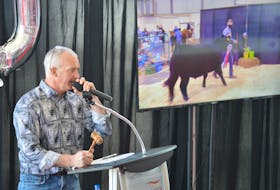I discovered two things when I looked into joining a gym the other day: because I am over 60, I get a discount on the monthly rate, which is great.
On the other hand, this means that I now qualify for something called THE SENIOR'S DISCOUNT, which shouldn’t have surprised me one bit, but, as you can see, did — at least enough to decide, then and there, to write a column about it.
Because, how could this be so?
How could little Johnny DeMont — who used to have a pile of Sgt. Fury comics under his bed, who once drove a bicycle with a hockey card clothes-pinned to the spokes for sound effect, who, during a long-ago Christmas concert, soloed the Little Drummer Boy in a quavering falsetto, who, for a long time, thought Ginger, on Gilligan’s Island, the epitome of female sophistication — now be eligible for 10 per cent off at Rona, Canadian Tire and Bulk Barn, as well as a 20 per cent benefit at Shopper’s Drug Mart, and an 85-cent coffee at McDonald’s. (All of these numbers, by the way, come from a personal finance blog called MapleMoney, which in a peculiar coincidence has a logo that looks an awful lot like the one Conservative leadership hopeful Peter MacKay unveiled recently).
Now I’m as happy to have a little extra change rattling around in my pocket as the next person. And know that I will take advantage of every possible financial benefit accruing to my venerable friends and me. (In fact, if you know of more, please send them along.)
Successful aging
But this reminder of another one of those milestones — as artificial and arbitrary as it might be, since age, as we tell ourselves, is just another number — still sent me scurrying down to Bookmark, in search of a volume that has been getting some buzz lately.
It's called Successful Aging: A Neuroscientist Explores the Power and Potential of Our Lives, and it’s by Daniel J. Levitin, who, as well as being a neuroscientist, is a cognitive psychologist and best-selling author, splitting his time between California and Montreal.
My friends, it contains good news. It is also what publishers call timely since, as Levitin notes, two-thirds of the people over 65 who have ever lived happen to be alive this very moment.
His central thesis is that we need a different vision of old age, “one that sees our final decades as a period of blossoming, a resurgence of life that does not chase our younger years, but instead embraces the gifts that time can bring.”
What are those, you might ask? Better abstract reasoning and practical intelligence, says Levitin, the brain expert. “While it may be difficult for older adults to pick up a new skill, they will excel in their area of expertise more than ever before,” he writes.
I was also pleased to learn that memory loss isn’t as inevitable as we thought it was, particularly if we do the right things.
As someone who likes to get out and move around, I was happy, as well, to see him support the notion that exercise does make a difference in mental vitality later on.
Although not just any kind of exercise: get off the treadmill Levitin says, since the best way to fend off cognitive decline is doing stuff in “varied, natural environments.” You know, outside.
Aging cheat sheet
In the end — and, wonderfully for a book that, though seamlessly written, is almost 500 pages long — Levitin sums up all of his scholarship in an appendix of steps to rejuvenate your brain:
- Don’t retire. Don’t stop being engaged with meaningful work.
- Look forward. Don’t look back. (Reminiscing doesn’t promote health.)
- Exercise. Get your heart rate going. Preferably in nature.
- Embrace a moderated lifestyle with healthy practices.
- Keep your social circle exciting and new.
- Spend time with people younger than you.
- See your doctor regularly, but not obsessively.
- Don’t think of yourself as old (other than taking prudent precautions).
- Appreciate your cognitive strengths — pattern recognition, crystallized intelligence, wisdom, accumulated knowledge.
- Promote cognitive health through experiential learning: travelling, spending time with grandchildren and immersing yourself in new activities and situations. Do new things.
That the future isn’t just an inevitable, sad decline is good news. So is another point he makes.
In the very last paragraph in his introduction Levitin goes on a little riff about what old-timers, looking back on their lives, tend to think was the time when they were happiest.
Perhaps childhood, when you didn’t know what was out there waiting for you. Or the teenage years when the hormones roar.
Maybe, asks Levitin, university when you’re just getting started, or the early years of building a family.
“Wrong,” he writes. “The age that comes up most often as the happiest time of one’s life is 82.”
Which, I have to tell you, is news good enough to even rival the senior’s discount.









